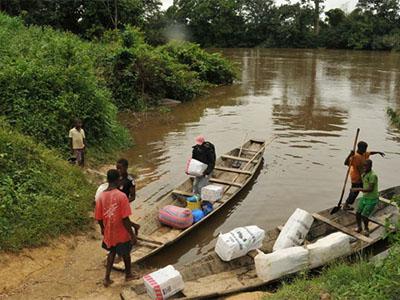
Reaching Out to Communities at Risk of Ebola in Liberia
HISTORY AND CONTEXT
As people continue to cross borders, the risk of Ebola spreading further remains high. Cultural, religious, and traditional beliefs, and refusal of some families to treat family members who are sick, have strained efforts to contain the outbreak.
DECIDING TO CONDUCT A SOCIAL MARKETING CAMPAIGN
To date, some 200 volunteers – supported by various national and international organizations – have been working in affected villages in Liberia. But more volunteers are urgently required to accelerate communication within communities.
Liberia’s State Ministry of Health and Social Welfare, with support from various organizations, is accelerating community education and social mobilization activities in affected communities.
GOALS AND BEHAVIORAL OBJECTIVES
Informing at-risk communities about Ebola and telling them what to do to protect themselves is key to preventing new infections. In the village of Zango in Voinjama, Lofa County, where denial of Ebola was initially reported as extremely high, the social mobilization team has designed an approach to address specific issues, such as beliefs about poisoning and witchcraft.
The main messages are: how to protect oneself, what to do if someone is sick, where to report cases, and how the dead should be handled. Volunteers speak the local language.
As an integral component of the Ebola response efforts, community education needs to be intensified. A coordinated approach among health partners with proper messaging that addresses issues of denial and resistance in the community remains a priority for Liberia as it scales up its fight against the disease.
POTENTIAL PARTNERS
Social mobilization partners have been working on countering misconceptions about Ebola. At the Foya Case Management Centre (CMC) in Lofa County, a 52-year-old Ebola survivor from Koindu town in Sierra Leone recounts how she lost her only daughter and a sister to Ebola. She is one of 15 survivors who were treated at the Foya Centre. Stories like this help encourage others that there is hope after being infected by Ebola if they seek proper treatment.
WHO and UNICEF staff also talked about Ebola with the elderly in Sulumba village near the border with Guinea.
DEFINING THE AUDIENCE
Increasing participation of elders, as well as religious leaders, is vital. These highly respected leaders have a unique opportunity to mobilize communities. During a social mobilization campaign in Sulumba, Foya, volunteers gathered community members through the elders to sensitize them on what to do to prevent getting sick.
ANALYZING KEY BEHAVIORS AND ENVIRONMENTS RELATED TO THE GOAL
Social mobilization activities are supported by psychosocial teams who can help people express their grief. Lucana Kurvah, a mental health clinician, helped a psychosocial team explain to community members in Zango town, Lofa County, why they need to immediately report any sick family members. She emphasized that no one should treat sick persons using traditional methods. “This is a big challenge – the fact is that there are people who still do not believe that Ebola exists.”
Harrison Sakilla, a 39-year-old teacher, is the first patient at the Foya case management center to survive Ebola. He told his story for the rest of the Liberians to understand that if you get ill and present yourself immediately for treatment, there is hope that you will survive Ebola. “When you start feeling sick, go the nearest health centre and let them take care of you. That’s what I did.” Harrison’s story is one of the many stories of hope that will be repeated time and again during the village-to-village campaigns in Liberia.
IMPLEMENT THE SOCIAL MARKTING CAMPAIGN
To support social mobilization campaigns in affected or at-risk villages in Lofa, banners with messages on Ebola now hang at immigration checkpoints and various town centres. They serve as reminders to everyone of the need to protect themselves.
Community radio is a powerful tool to spread life-saving messages. Radio Halengi, a community radio station that airs from Kulahon in Lofa County, has regularly played public service announcements on Ebola since the outbreak hit the county. Edong Yalla, a community announcer, said that non-government organizations and government agencies have been providing them with materials that they air for free, or sometimes with minimal airtime cost.
The National Task Force on Ebola led by the Ministry of Health and Social Welfare has a sub-committee on social mobilization, which has been coordinating health partners’ messaging and production and dissemination of materials.
Adapted from the photo story entitled, Reaching out to communities at risk of Ebola in Liberia, World Health Organization, 2014.


